ANTH 100 Exam Essay: Politics of Kinship, Family, and Cultural Systems
VerifiedAdded on 2022/09/22
|8
|1822
|24
Essay
AI Summary
This essay provides an in-depth analysis of kinship and family within the framework of cultural anthropology, addressing two key questions. The first question explores kinship as a cultural system, examining the function of cultural categories and their roles in defining relationships. It discusses how kinship systems evolve and how they are influenced by historical and social factors, including the impact of marriage, reproduction, and family structures on cultural construction. The second question delves into the politics of kinship and family, investigating how kinship theory reflects economic and colonial logics, and how these logics affect our understanding and analysis of gender. It examines the influence of capitalism, patrilineal inheritance, and gendered divisions of labor, and highlights the complexities of kinship, marriage, and gender politics across diverse cultures. The essay draws upon various sources including the works of David M. Schneider, Marshall Sahlins, Susan McKinnon, and Kim TallBear to provide a comprehensive understanding of the topic.
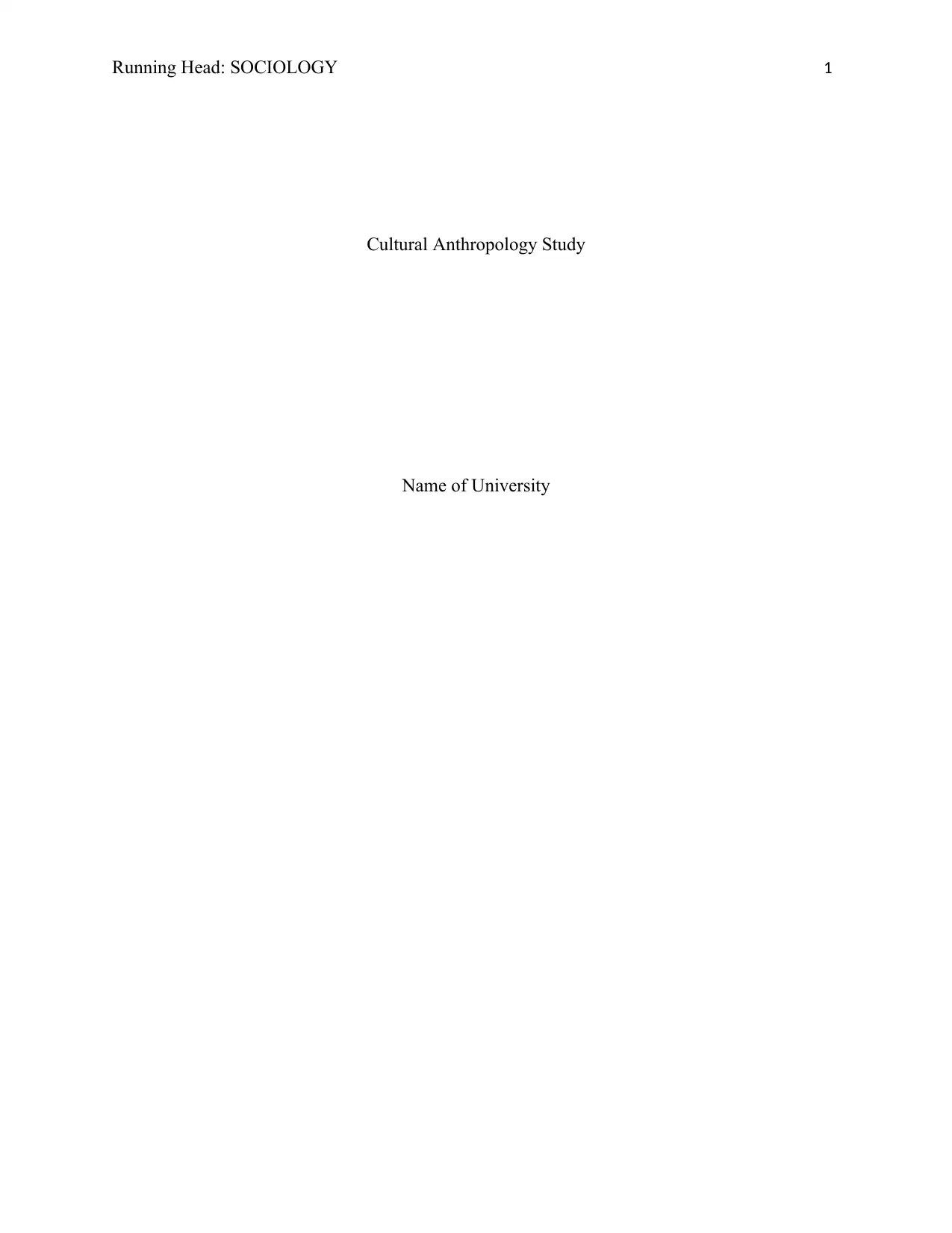
Running Head: SOCIOLOGY 1
Cultural Anthropology Study
Name of University
Cultural Anthropology Study
Name of University
Paraphrase This Document
Need a fresh take? Get an instant paraphrase of this document with our AI Paraphraser
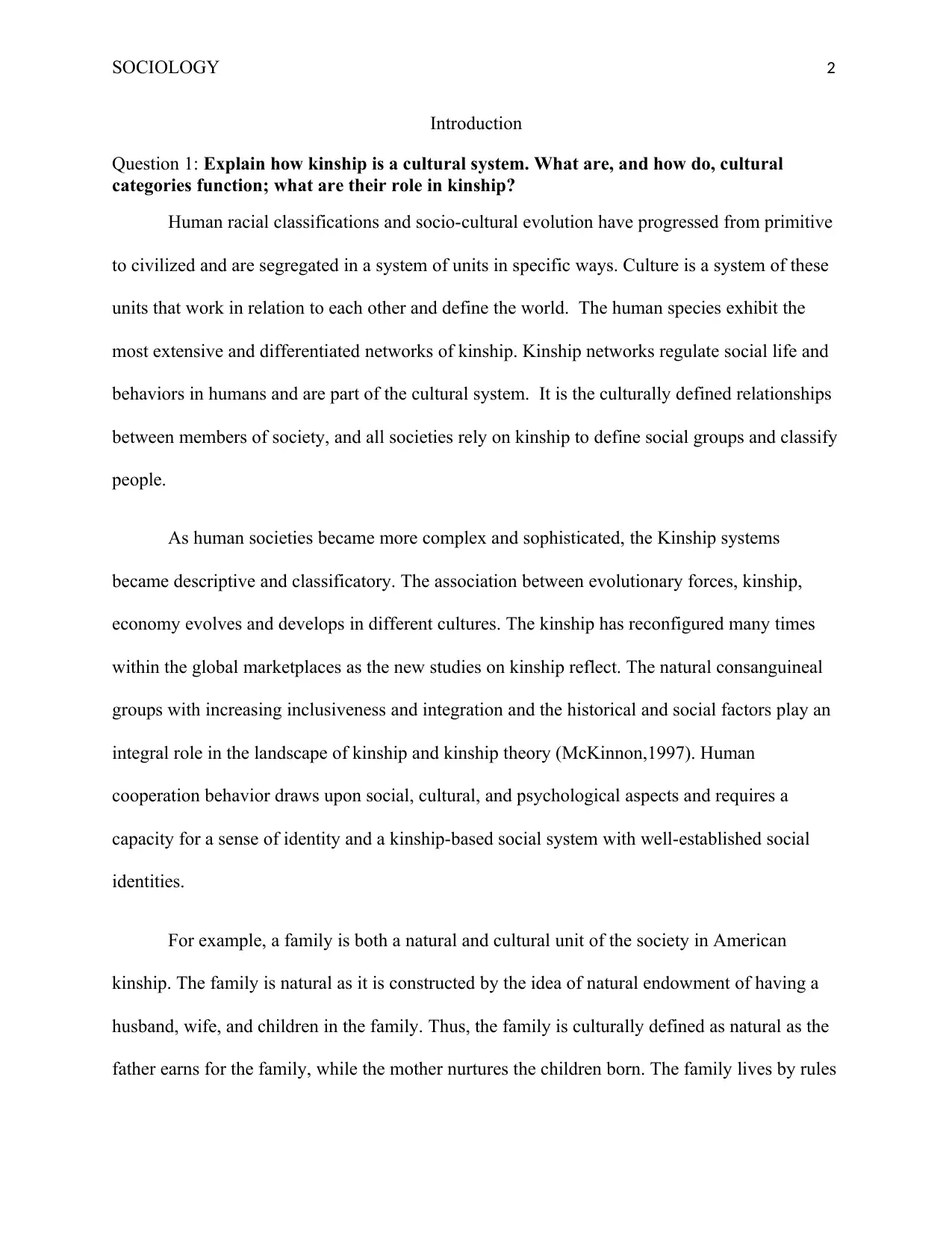
SOCIOLOGY 2
Introduction
Question 1: Explain how kinship is a cultural system. What are, and how do, cultural
categories function; what are their role in kinship?
Human racial classifications and socio-cultural evolution have progressed from primitive
to civilized and are segregated in a system of units in specific ways. Culture is a system of these
units that work in relation to each other and define the world. The human species exhibit the
most extensive and differentiated networks of kinship. Kinship networks regulate social life and
behaviors in humans and are part of the cultural system. It is the culturally defined relationships
between members of society, and all societies rely on kinship to define social groups and classify
people.
As human societies became more complex and sophisticated, the Kinship systems
became descriptive and classificatory. The association between evolutionary forces, kinship,
economy evolves and develops in different cultures. The kinship has reconfigured many times
within the global marketplaces as the new studies on kinship reflect. The natural consanguineal
groups with increasing inclusiveness and integration and the historical and social factors play an
integral role in the landscape of kinship and kinship theory (McKinnon,1997). Human
cooperation behavior draws upon social, cultural, and psychological aspects and requires a
capacity for a sense of identity and a kinship-based social system with well-established social
identities.
For example, a family is both a natural and cultural unit of the society in American
kinship. The family is natural as it is constructed by the idea of natural endowment of having a
husband, wife, and children in the family. Thus, the family is culturally defined as natural as the
father earns for the family, while the mother nurtures the children born. The family lives by rules
Introduction
Question 1: Explain how kinship is a cultural system. What are, and how do, cultural
categories function; what are their role in kinship?
Human racial classifications and socio-cultural evolution have progressed from primitive
to civilized and are segregated in a system of units in specific ways. Culture is a system of these
units that work in relation to each other and define the world. The human species exhibit the
most extensive and differentiated networks of kinship. Kinship networks regulate social life and
behaviors in humans and are part of the cultural system. It is the culturally defined relationships
between members of society, and all societies rely on kinship to define social groups and classify
people.
As human societies became more complex and sophisticated, the Kinship systems
became descriptive and classificatory. The association between evolutionary forces, kinship,
economy evolves and develops in different cultures. The kinship has reconfigured many times
within the global marketplaces as the new studies on kinship reflect. The natural consanguineal
groups with increasing inclusiveness and integration and the historical and social factors play an
integral role in the landscape of kinship and kinship theory (McKinnon,1997). Human
cooperation behavior draws upon social, cultural, and psychological aspects and requires a
capacity for a sense of identity and a kinship-based social system with well-established social
identities.
For example, a family is both a natural and cultural unit of the society in American
kinship. The family is natural as it is constructed by the idea of natural endowment of having a
husband, wife, and children in the family. Thus, the family is culturally defined as natural as the
father earns for the family, while the mother nurtures the children born. The family lives by rules
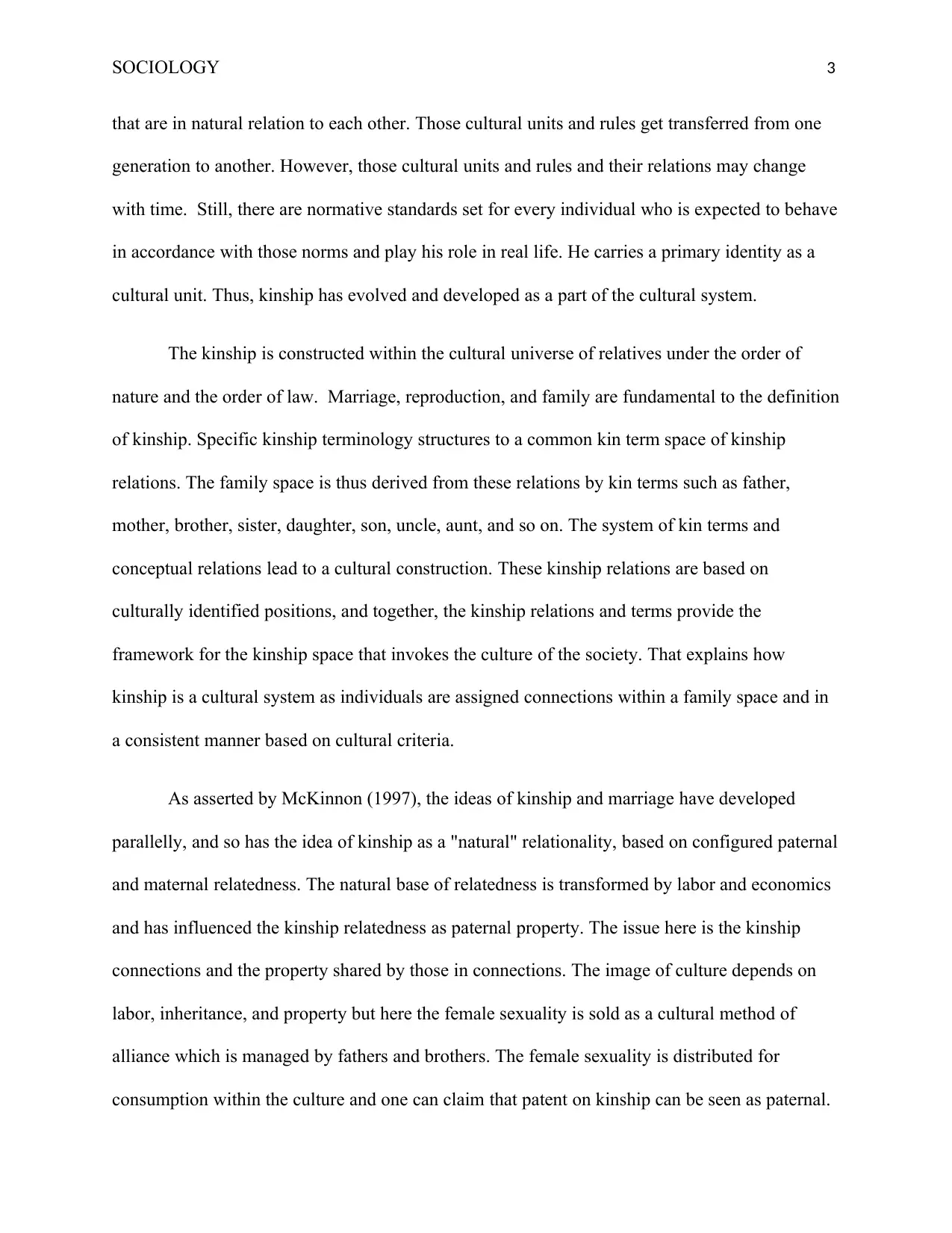
SOCIOLOGY 3
that are in natural relation to each other. Those cultural units and rules get transferred from one
generation to another. However, those cultural units and rules and their relations may change
with time. Still, there are normative standards set for every individual who is expected to behave
in accordance with those norms and play his role in real life. He carries a primary identity as a
cultural unit. Thus, kinship has evolved and developed as a part of the cultural system.
The kinship is constructed within the cultural universe of relatives under the order of
nature and the order of law. Marriage, reproduction, and family are fundamental to the definition
of kinship. Specific kinship terminology structures to a common kin term space of kinship
relations. The family space is thus derived from these relations by kin terms such as father,
mother, brother, sister, daughter, son, uncle, aunt, and so on. The system of kin terms and
conceptual relations lead to a cultural construction. These kinship relations are based on
culturally identified positions, and together, the kinship relations and terms provide the
framework for the kinship space that invokes the culture of the society. That explains how
kinship is a cultural system as individuals are assigned connections within a family space and in
a consistent manner based on cultural criteria.
As asserted by McKinnon (1997), the ideas of kinship and marriage have developed
parallelly, and so has the idea of kinship as a "natural" relationality, based on configured paternal
and maternal relatedness. The natural base of relatedness is transformed by labor and economics
and has influenced the kinship relatedness as paternal property. The issue here is the kinship
connections and the property shared by those in connections. The image of culture depends on
labor, inheritance, and property but here the female sexuality is sold as a cultural method of
alliance which is managed by fathers and brothers. The female sexuality is distributed for
consumption within the culture and one can claim that patent on kinship can be seen as paternal.
that are in natural relation to each other. Those cultural units and rules get transferred from one
generation to another. However, those cultural units and rules and their relations may change
with time. Still, there are normative standards set for every individual who is expected to behave
in accordance with those norms and play his role in real life. He carries a primary identity as a
cultural unit. Thus, kinship has evolved and developed as a part of the cultural system.
The kinship is constructed within the cultural universe of relatives under the order of
nature and the order of law. Marriage, reproduction, and family are fundamental to the definition
of kinship. Specific kinship terminology structures to a common kin term space of kinship
relations. The family space is thus derived from these relations by kin terms such as father,
mother, brother, sister, daughter, son, uncle, aunt, and so on. The system of kin terms and
conceptual relations lead to a cultural construction. These kinship relations are based on
culturally identified positions, and together, the kinship relations and terms provide the
framework for the kinship space that invokes the culture of the society. That explains how
kinship is a cultural system as individuals are assigned connections within a family space and in
a consistent manner based on cultural criteria.
As asserted by McKinnon (1997), the ideas of kinship and marriage have developed
parallelly, and so has the idea of kinship as a "natural" relationality, based on configured paternal
and maternal relatedness. The natural base of relatedness is transformed by labor and economics
and has influenced the kinship relatedness as paternal property. The issue here is the kinship
connections and the property shared by those in connections. The image of culture depends on
labor, inheritance, and property but here the female sexuality is sold as a cultural method of
alliance which is managed by fathers and brothers. The female sexuality is distributed for
consumption within the culture and one can claim that patent on kinship can be seen as paternal.
⊘ This is a preview!⊘
Do you want full access?
Subscribe today to unlock all pages.

Trusted by 1+ million students worldwide
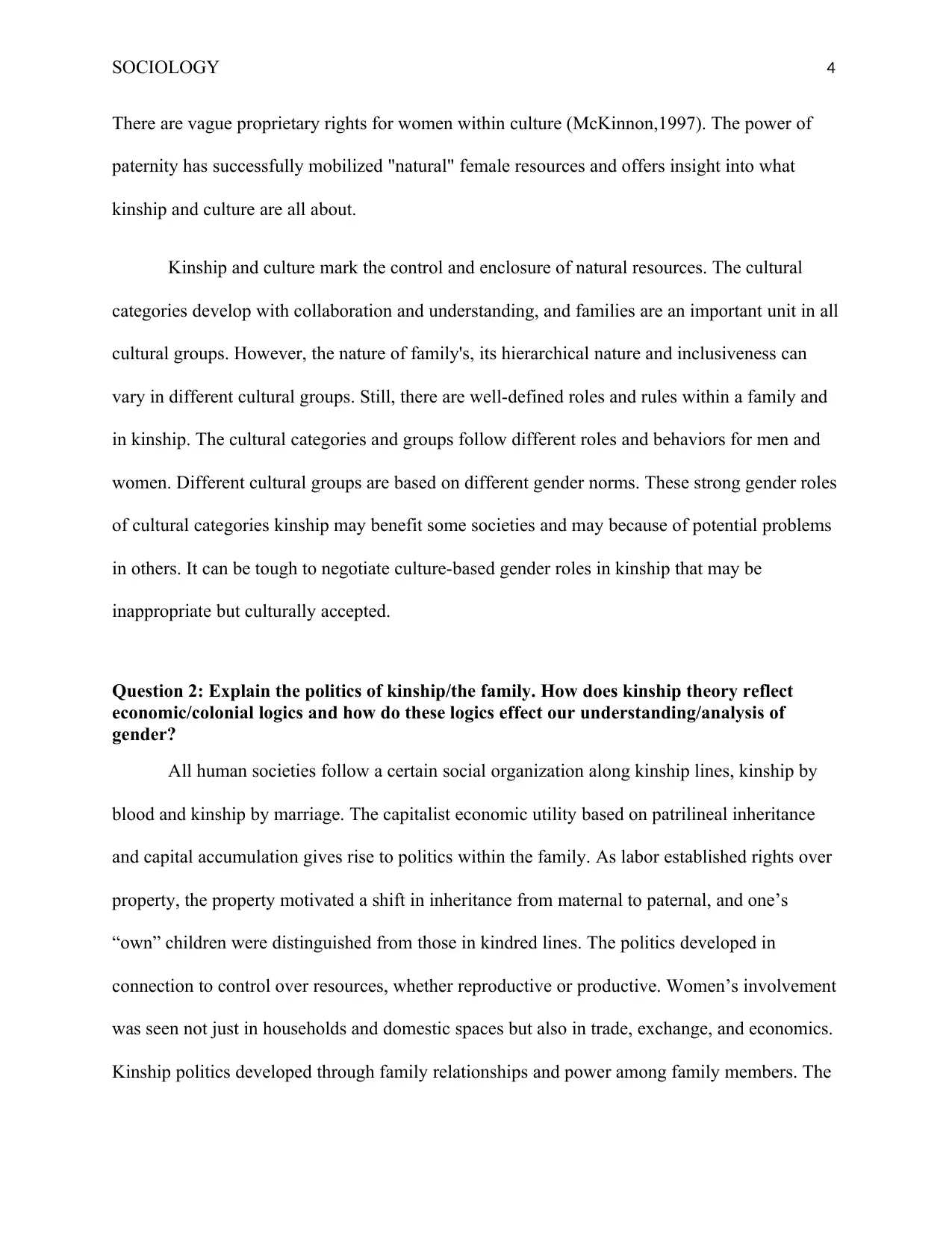
SOCIOLOGY 4
There are vague proprietary rights for women within culture (McKinnon,1997). The power of
paternity has successfully mobilized "natural" female resources and offers insight into what
kinship and culture are all about.
Kinship and culture mark the control and enclosure of natural resources. The cultural
categories develop with collaboration and understanding, and families are an important unit in all
cultural groups. However, the nature of family's, its hierarchical nature and inclusiveness can
vary in different cultural groups. Still, there are well-defined roles and rules within a family and
in kinship. The cultural categories and groups follow different roles and behaviors for men and
women. Different cultural groups are based on different gender norms. These strong gender roles
of cultural categories kinship may benefit some societies and may because of potential problems
in others. It can be tough to negotiate culture-based gender roles in kinship that may be
inappropriate but culturally accepted.
Question 2: Explain the politics of kinship/the family. How does kinship theory reflect
economic/colonial logics and how do these logics effect our understanding/analysis of
gender?
All human societies follow a certain social organization along kinship lines, kinship by
blood and kinship by marriage. The capitalist economic utility based on patrilineal inheritance
and capital accumulation gives rise to politics within the family. As labor established rights over
property, the property motivated a shift in inheritance from maternal to paternal, and one’s
“own” children were distinguished from those in kindred lines. The politics developed in
connection to control over resources, whether reproductive or productive. Women’s involvement
was seen not just in households and domestic spaces but also in trade, exchange, and economics.
Kinship politics developed through family relationships and power among family members. The
There are vague proprietary rights for women within culture (McKinnon,1997). The power of
paternity has successfully mobilized "natural" female resources and offers insight into what
kinship and culture are all about.
Kinship and culture mark the control and enclosure of natural resources. The cultural
categories develop with collaboration and understanding, and families are an important unit in all
cultural groups. However, the nature of family's, its hierarchical nature and inclusiveness can
vary in different cultural groups. Still, there are well-defined roles and rules within a family and
in kinship. The cultural categories and groups follow different roles and behaviors for men and
women. Different cultural groups are based on different gender norms. These strong gender roles
of cultural categories kinship may benefit some societies and may because of potential problems
in others. It can be tough to negotiate culture-based gender roles in kinship that may be
inappropriate but culturally accepted.
Question 2: Explain the politics of kinship/the family. How does kinship theory reflect
economic/colonial logics and how do these logics effect our understanding/analysis of
gender?
All human societies follow a certain social organization along kinship lines, kinship by
blood and kinship by marriage. The capitalist economic utility based on patrilineal inheritance
and capital accumulation gives rise to politics within the family. As labor established rights over
property, the property motivated a shift in inheritance from maternal to paternal, and one’s
“own” children were distinguished from those in kindred lines. The politics developed in
connection to control over resources, whether reproductive or productive. Women’s involvement
was seen not just in households and domestic spaces but also in trade, exchange, and economics.
Kinship politics developed through family relationships and power among family members. The
Paraphrase This Document
Need a fresh take? Get an instant paraphrase of this document with our AI Paraphraser
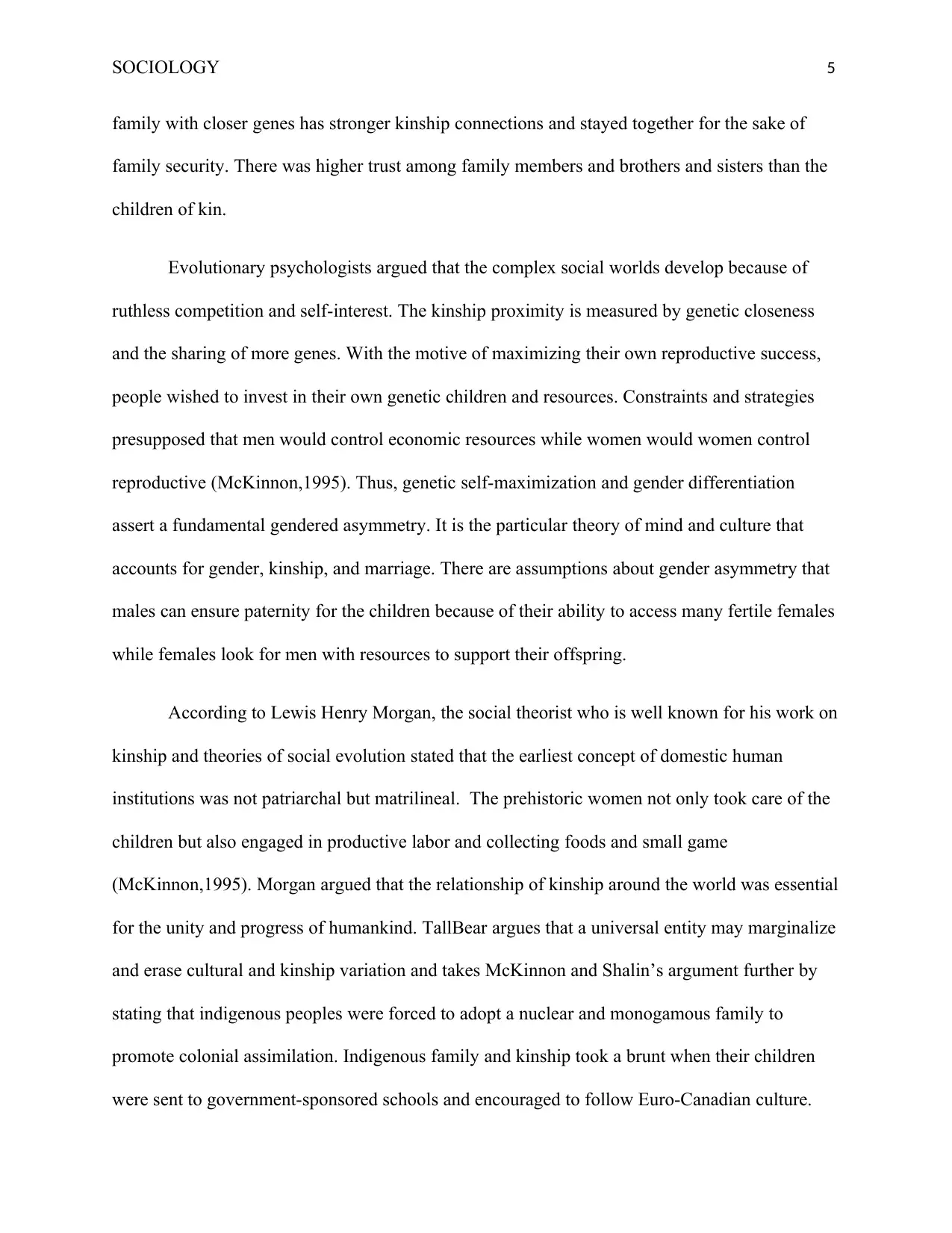
SOCIOLOGY 5
family with closer genes has stronger kinship connections and stayed together for the sake of
family security. There was higher trust among family members and brothers and sisters than the
children of kin.
Evolutionary psychologists argued that the complex social worlds develop because of
ruthless competition and self-interest. The kinship proximity is measured by genetic closeness
and the sharing of more genes. With the motive of maximizing their own reproductive success,
people wished to invest in their own genetic children and resources. Constraints and strategies
presupposed that men would control economic resources while women would women control
reproductive (McKinnon,1995). Thus, genetic self-maximization and gender differentiation
assert a fundamental gendered asymmetry. It is the particular theory of mind and culture that
accounts for gender, kinship, and marriage. There are assumptions about gender asymmetry that
males can ensure paternity for the children because of their ability to access many fertile females
while females look for men with resources to support their offspring.
According to Lewis Henry Morgan, the social theorist who is well known for his work on
kinship and theories of social evolution stated that the earliest concept of domestic human
institutions was not patriarchal but matrilineal. The prehistoric women not only took care of the
children but also engaged in productive labor and collecting foods and small game
(McKinnon,1995). Morgan argued that the relationship of kinship around the world was essential
for the unity and progress of humankind. TallBear argues that a universal entity may marginalize
and erase cultural and kinship variation and takes McKinnon and Shalin’s argument further by
stating that indigenous peoples were forced to adopt a nuclear and monogamous family to
promote colonial assimilation. Indigenous family and kinship took a brunt when their children
were sent to government-sponsored schools and encouraged to follow Euro-Canadian culture.
family with closer genes has stronger kinship connections and stayed together for the sake of
family security. There was higher trust among family members and brothers and sisters than the
children of kin.
Evolutionary psychologists argued that the complex social worlds develop because of
ruthless competition and self-interest. The kinship proximity is measured by genetic closeness
and the sharing of more genes. With the motive of maximizing their own reproductive success,
people wished to invest in their own genetic children and resources. Constraints and strategies
presupposed that men would control economic resources while women would women control
reproductive (McKinnon,1995). Thus, genetic self-maximization and gender differentiation
assert a fundamental gendered asymmetry. It is the particular theory of mind and culture that
accounts for gender, kinship, and marriage. There are assumptions about gender asymmetry that
males can ensure paternity for the children because of their ability to access many fertile females
while females look for men with resources to support their offspring.
According to Lewis Henry Morgan, the social theorist who is well known for his work on
kinship and theories of social evolution stated that the earliest concept of domestic human
institutions was not patriarchal but matrilineal. The prehistoric women not only took care of the
children but also engaged in productive labor and collecting foods and small game
(McKinnon,1995). Morgan argued that the relationship of kinship around the world was essential
for the unity and progress of humankind. TallBear argues that a universal entity may marginalize
and erase cultural and kinship variation and takes McKinnon and Shalin’s argument further by
stating that indigenous peoples were forced to adopt a nuclear and monogamous family to
promote colonial assimilation. Indigenous family and kinship took a brunt when their children
were sent to government-sponsored schools and encouraged to follow Euro-Canadian culture.
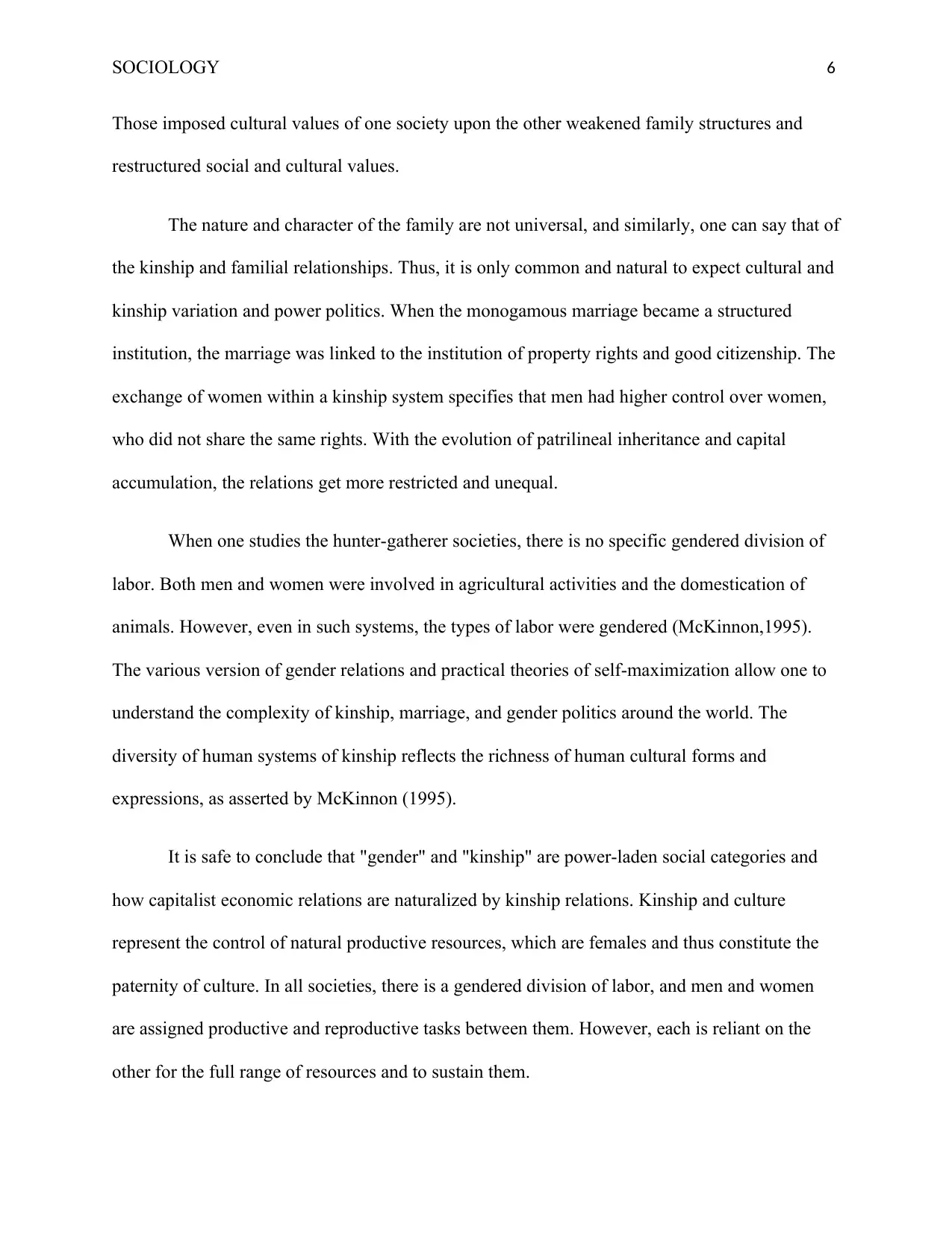
SOCIOLOGY 6
Those imposed cultural values of one society upon the other weakened family structures and
restructured social and cultural values.
The nature and character of the family are not universal, and similarly, one can say that of
the kinship and familial relationships. Thus, it is only common and natural to expect cultural and
kinship variation and power politics. When the monogamous marriage became a structured
institution, the marriage was linked to the institution of property rights and good citizenship. The
exchange of women within a kinship system specifies that men had higher control over women,
who did not share the same rights. With the evolution of patrilineal inheritance and capital
accumulation, the relations get more restricted and unequal.
When one studies the hunter-gatherer societies, there is no specific gendered division of
labor. Both men and women were involved in agricultural activities and the domestication of
animals. However, even in such systems, the types of labor were gendered (McKinnon,1995).
The various version of gender relations and practical theories of self-maximization allow one to
understand the complexity of kinship, marriage, and gender politics around the world. The
diversity of human systems of kinship reflects the richness of human cultural forms and
expressions, as asserted by McKinnon (1995).
It is safe to conclude that "gender" and "kinship" are power-laden social categories and
how capitalist economic relations are naturalized by kinship relations. Kinship and culture
represent the control of natural productive resources, which are females and thus constitute the
paternity of culture. In all societies, there is a gendered division of labor, and men and women
are assigned productive and reproductive tasks between them. However, each is reliant on the
other for the full range of resources and to sustain them.
Those imposed cultural values of one society upon the other weakened family structures and
restructured social and cultural values.
The nature and character of the family are not universal, and similarly, one can say that of
the kinship and familial relationships. Thus, it is only common and natural to expect cultural and
kinship variation and power politics. When the monogamous marriage became a structured
institution, the marriage was linked to the institution of property rights and good citizenship. The
exchange of women within a kinship system specifies that men had higher control over women,
who did not share the same rights. With the evolution of patrilineal inheritance and capital
accumulation, the relations get more restricted and unequal.
When one studies the hunter-gatherer societies, there is no specific gendered division of
labor. Both men and women were involved in agricultural activities and the domestication of
animals. However, even in such systems, the types of labor were gendered (McKinnon,1995).
The various version of gender relations and practical theories of self-maximization allow one to
understand the complexity of kinship, marriage, and gender politics around the world. The
diversity of human systems of kinship reflects the richness of human cultural forms and
expressions, as asserted by McKinnon (1995).
It is safe to conclude that "gender" and "kinship" are power-laden social categories and
how capitalist economic relations are naturalized by kinship relations. Kinship and culture
represent the control of natural productive resources, which are females and thus constitute the
paternity of culture. In all societies, there is a gendered division of labor, and men and women
are assigned productive and reproductive tasks between them. However, each is reliant on the
other for the full range of resources and to sustain them.
⊘ This is a preview!⊘
Do you want full access?
Subscribe today to unlock all pages.

Trusted by 1+ million students worldwide
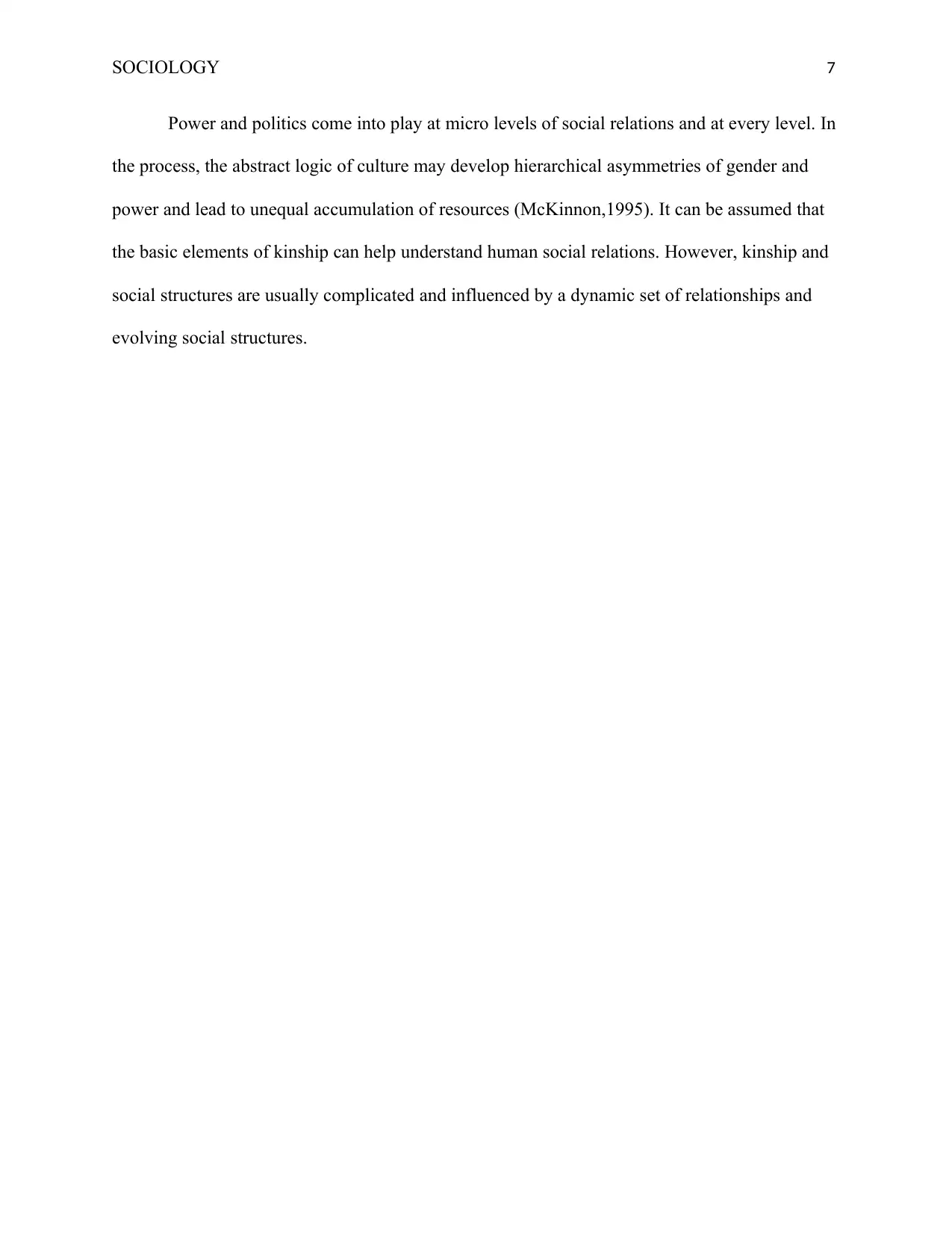
SOCIOLOGY 7
Power and politics come into play at micro levels of social relations and at every level. In
the process, the abstract logic of culture may develop hierarchical asymmetries of gender and
power and lead to unequal accumulation of resources (McKinnon,1995). It can be assumed that
the basic elements of kinship can help understand human social relations. However, kinship and
social structures are usually complicated and influenced by a dynamic set of relationships and
evolving social structures.
Power and politics come into play at micro levels of social relations and at every level. In
the process, the abstract logic of culture may develop hierarchical asymmetries of gender and
power and lead to unequal accumulation of resources (McKinnon,1995). It can be assumed that
the basic elements of kinship can help understand human social relations. However, kinship and
social structures are usually complicated and influenced by a dynamic set of relationships and
evolving social structures.
Paraphrase This Document
Need a fresh take? Get an instant paraphrase of this document with our AI Paraphraser
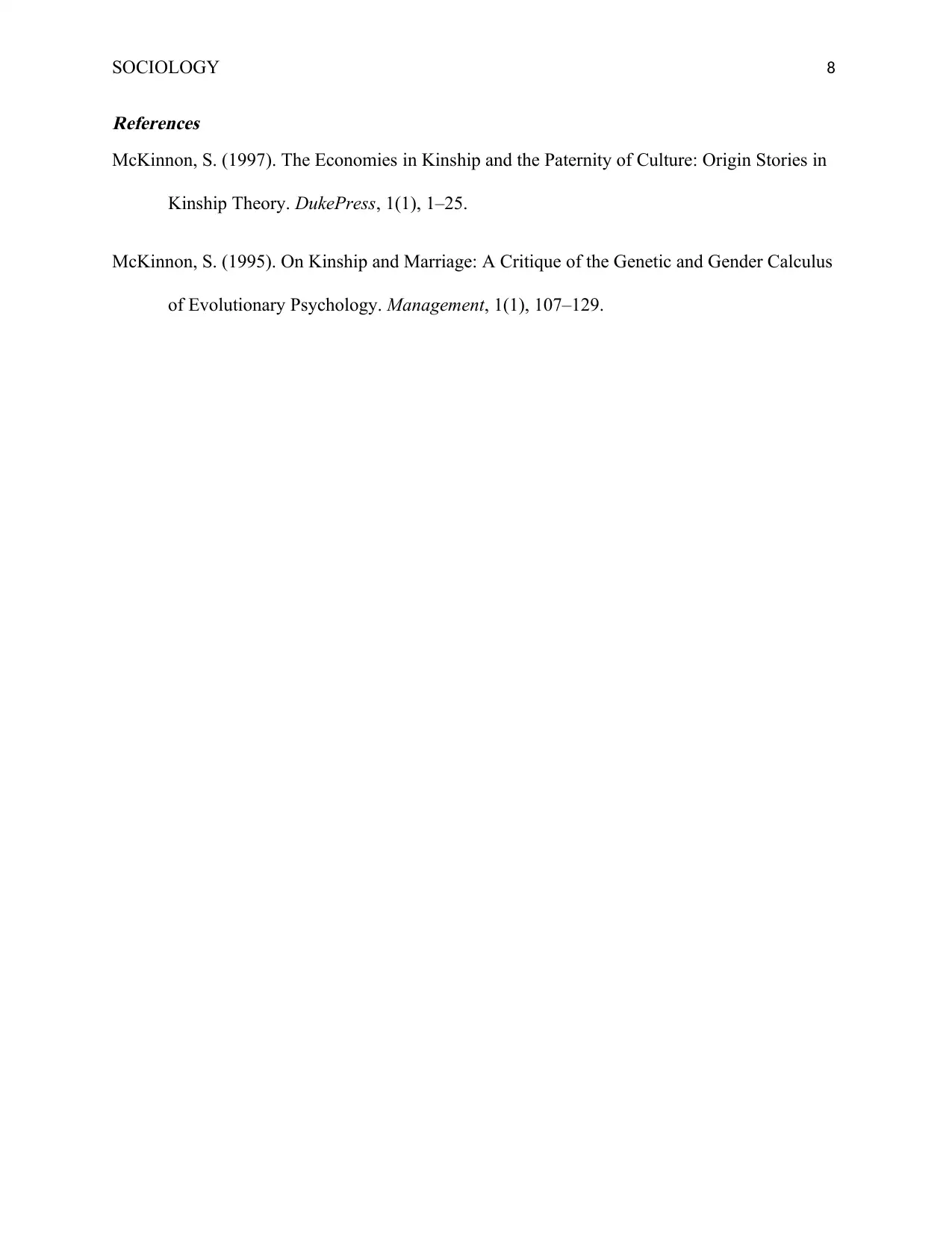
SOCIOLOGY 8
References
McKinnon, S. (1997). The Economies in Kinship and the Paternity of Culture: Origin Stories in
Kinship Theory. DukePress, 1(1), 1–25.
McKinnon, S. (1995). On Kinship and Marriage: A Critique of the Genetic and Gender Calculus
of Evolutionary Psychology. Management, 1(1), 107–129.
References
McKinnon, S. (1997). The Economies in Kinship and the Paternity of Culture: Origin Stories in
Kinship Theory. DukePress, 1(1), 1–25.
McKinnon, S. (1995). On Kinship and Marriage: A Critique of the Genetic and Gender Calculus
of Evolutionary Psychology. Management, 1(1), 107–129.
1 out of 8
Related Documents
Your All-in-One AI-Powered Toolkit for Academic Success.
+13062052269
info@desklib.com
Available 24*7 on WhatsApp / Email
![[object Object]](/_next/static/media/star-bottom.7253800d.svg)
Unlock your academic potential
Copyright © 2020–2026 A2Z Services. All Rights Reserved. Developed and managed by ZUCOL.





